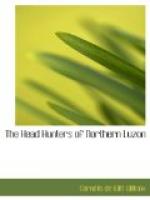The people of Solano made a great effort to have us stay the night, but it was impossible; we had to get on to Bagabag. Solano, by the way, is the commercial emporium of this end of the province, for there is not a single shop in Bayombong. So on we went, through a calm, dignified afternoon, the country as before impressing me with its open, smiling valleys, its broad fields, its air of expectant fertility, inviting one to come scratch its surface, if no more, in order to reap abundant harvests. In fact, it seemed to me that we were riding through typical farming land at home, instead of through a Malay valley under the tropic. And if anything more were needed to strengthen the illusion, it was a college yell, given by a gang of Ifugaos (the people we were now immediately on our way to visit) repairing a bridge we had to cross! They did it in style, and naturally had no cheer-leader; time was kept by beating on the floor of the bridge with tools. For this uttering of a shout of welcome or of other emotion in unison is a characteristic trait of the Ifugaos, like their using spoons, and can be likened to nothing else in the world but our American college yell.
Our reception at Bagabag was much like all the others we had had: bands, arches, addresses, one in excellent English. But on this occasion, after listening to a speech telling how poor the people were, how bad the roads were, how much they needed Government help, etc., etc., Mr. Forbes squared off in his answer, and told them a few things, as that he had seen so far not a single lean, hungry-looking person, that the elements were kindly, that they could mend their own roads, and that he was tired of their everlasting complaint of poverty and hunger, when a little work would go a great way in this country toward bettering their material condition. This, of course, is just the kind of talk these people need, and the last some of them wish to hear.




